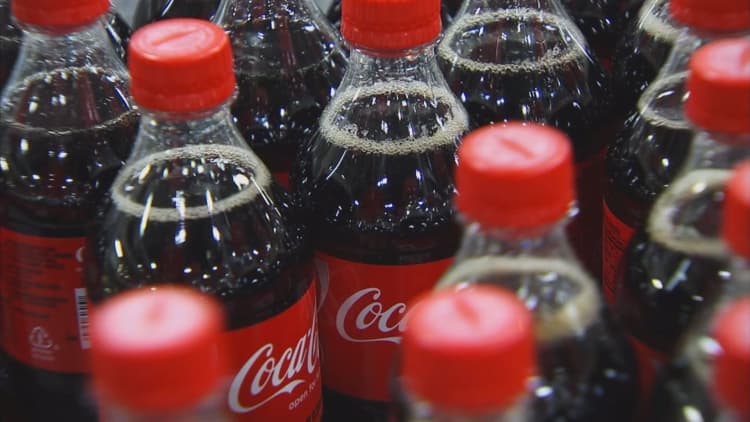
Coca-Cola on Wednesday reported second-quarter earnings and revenue that beat analysts' expectations, bolstered by its efforts to bring its diet drinks around the world.
During the quarter, the company launched its dairy-free smoothie brand AdeZ in Europe and debuted Coca-Cola Stevia No Sugar in New Zealand. It also brought its revamped Diet Coke campaign to Britain, following its previous launch in the U.S.
Here’s how the company did compared with Thomson Reuters estimates:
- Adjusted earnings per share: 61 cents vs. 60 cents forecast
- Revenue: $8.90 billion vs. $8.54 billion forecast
Shares of Coca-Cola were up 2.3 percent by midday Wednesday.
The company reported net income of $2.32 billion, or 54 cents a share, up from earnings of $1.37 billion, or 32 cents a share during the same quarter a year ago.
After adjusting for continuing operations and other items, Coke said it earned 61 cents a share, a penny better than analysts were expecting in a survey by Thomson Reuters.
Earnings from continuing operations rose 68 percent to 53 cents a share.
Coke said revenue fell 8 percent to $8.90 billion from the previous year, but sales surpassed expectations because the decline was anticipated as the company worked on refranchising its bottling operations. It said volume grew 2 percent, driven in part by double-digit growth for Coca-Cola Zero Sugar. Coca-Cola has been able to revitalize its Diet Coke sales without harming Zero Sugar sales, CEO James Quincey told analysts Wednesday.
Its water and sports drinks, which include brands like Powerade, grew 4 percent.
Coke said second-quarter organic sales, which strips out the impact of foreign currency fluctuations, grew 5 percent. It clocked the strongest organic sales growth in Europe, Middle East & Africa and Latin America, with growth of 7 percent and 11 percent, respectively. Its European business was bolstered by its Coke's marketing efforts during the World Cup.
Coke's global growth helped to counteract weakness North America, where its organic sales dropped 1 percent.
Volume in the region grew 1 percent, dragged drown by weakness in its juice brands like Minute Maid. Volume of Coke's juice, dairy and plant-based drinks dropped 6 percent. The company attributed that decline in part to its shrunken juice boxes in response to increased costs of packaging and orange juice imports. It has also been shifting away from its less profitable juice drinks.
"I think the juice thing will start to improve as we get into the back half. We'll do better competitively. And I think the consumer environment will adjust to the new packaging in the new price points," Quincey told analysts.
Its carbonated drinks like Coca-Cola Zero Sugar, meantime, posted double digit volume growth.
For the year, Coke says it expects at least 4 percent growth in organic revenue and at least 9 percent growth in its adjusted net income.
In an interview later on CNBC, said the company is seeing cost pressures in part due to President 's tariffs on steel and aluminum.



